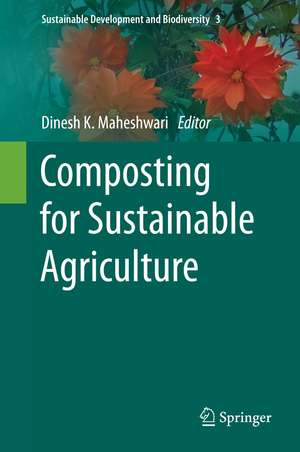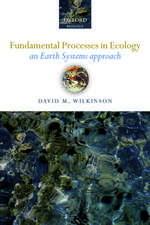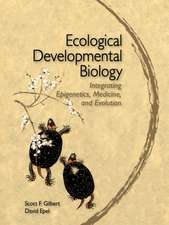Composting for Sustainable Agriculture: Sustainable Development and Biodiversity, cartea 3
Editat de Dinesh K. Maheshwarien Limba Engleză Hardback – 5 noi 2014
The future of agricultural depends upon our ability to enhance the productivity without damage to their long-term production potential. One of the strategies is the application of effective microbial products beneficial for both farmers and ecosystems. This kind of approach can ensure both ecological and economic sustainability. Soil microbial populations are immersed in framework of interactions, which are known to affect plant fitness and soil quality.
For betterment of life of human being, improvedquality and variety of products are formed due to versatile action of different group of microorganisms, Microbes are able to degrade solid waste material into compost which is a mixture of decayed organic matter, manure etc. Incomplete microbial degradation of organic waste where the microbial process varies aerobic to anaerobic form is stated as compost, if added to soil improves plant growth and development. The biological activities and microbial metabolism in the soil contribute to alter its mixture and fertility. Incorporation of organic remain in the form of compost is known to influence favourably the physio-chemical and biological properties of soil. The beneficial activities bestowed upon plants by compost utilization are multifaceted, hence most promising alternatives for achieving sustainable agricultural production.
An increased awareness on compost has led to their use in agricultural concern. Contents in the present book will comprised various chapters on the role of beneficial bacteria in the composting process. The application is depicted to achieve the attainable productivity besides, in disease management and suppressiveness of organisms of phytopathogenic in nature. Significance of the compost elicits certain responses e.g. soil reclamation, soil fertility, soil health and disease management exhibit due to quality compost amendment in soil. It serves as low cost prospective option for sustainable crop production and protection.
| Toate formatele și edițiile | Preț | Express |
|---|---|---|
| Paperback (1) | 944.82 lei 6-8 săpt. | |
| Springer International Publishing – 23 aug 2016 | 944.82 lei 6-8 săpt. | |
| Hardback (1) | 796.32 lei 17-23 zile | +68.37 lei 10-14 zile |
| Springer International Publishing – 5 noi 2014 | 796.32 lei 17-23 zile | +68.37 lei 10-14 zile |
Din seria Sustainable Development and Biodiversity
- 18%
 Preț: 962.18 lei
Preț: 962.18 lei - 18%
 Preț: 953.03 lei
Preț: 953.03 lei - 18%
 Preț: 952.09 lei
Preț: 952.09 lei - 18%
 Preț: 1563.72 lei
Preț: 1563.72 lei - 18%
 Preț: 1133.34 lei
Preț: 1133.34 lei - 18%
 Preț: 1219.63 lei
Preț: 1219.63 lei - 18%
 Preț: 1572.88 lei
Preț: 1572.88 lei - 24%
 Preț: 1564.46 lei
Preț: 1564.46 lei - 18%
 Preț: 1412.20 lei
Preț: 1412.20 lei - 18%
 Preț: 1669.03 lei
Preț: 1669.03 lei - 18%
 Preț: 955.08 lei
Preț: 955.08 lei - 24%
 Preț: 824.65 lei
Preț: 824.65 lei - 24%
 Preț: 824.11 lei
Preț: 824.11 lei - 24%
 Preț: 1052.02 lei
Preț: 1052.02 lei - 24%
 Preț: 900.82 lei
Preț: 900.82 lei - 24%
 Preț: 903.54 lei
Preț: 903.54 lei - 18%
 Preț: 1391.97 lei
Preț: 1391.97 lei - 15%
 Preț: 646.11 lei
Preț: 646.11 lei - 15%
 Preț: 645.60 lei
Preț: 645.60 lei - 24%
 Preț: 794.72 lei
Preț: 794.72 lei - 15%
 Preț: 705.51 lei
Preț: 705.51 lei - 24%
 Preț: 786.65 lei
Preț: 786.65 lei - 24%
 Preț: 983.34 lei
Preț: 983.34 lei - 18%
 Preț: 1559.80 lei
Preț: 1559.80 lei - 18%
 Preț: 1398.14 lei
Preț: 1398.14 lei - 18%
 Preț: 1416.47 lei
Preț: 1416.47 lei - 18%
 Preț: 1575.88 lei
Preț: 1575.88 lei - 18%
 Preț: 1400.50 lei
Preț: 1400.50 lei - 18%
 Preț: 953.20 lei
Preț: 953.20 lei - 20%
 Preț: 578.04 lei
Preț: 578.04 lei - 24%
 Preț: 820.34 lei
Preț: 820.34 lei - 20%
 Preț: 583.92 lei
Preț: 583.92 lei
Preț: 796.32 lei
Preț vechi: 1047.78 lei
-24% Nou
Puncte Express: 1194
Preț estimativ în valută:
152.37€ • 159.52$ • 126.08£
152.37€ • 159.52$ • 126.08£
Carte disponibilă
Livrare economică 11-17 martie
Livrare express 04-08 martie pentru 78.36 lei
Preluare comenzi: 021 569.72.76
Specificații
ISBN-13: 9783319080031
ISBN-10: 3319080032
Pagini: 350
Ilustrații: X, 290 p. 43 illus., 16 illus. in color.
Dimensiuni: 155 x 235 x 22 mm
Greutate: 0.62 kg
Ediția:2014
Editura: Springer International Publishing
Colecția Springer
Seria Sustainable Development and Biodiversity
Locul publicării:Cham, Switzerland
ISBN-10: 3319080032
Pagini: 350
Ilustrații: X, 290 p. 43 illus., 16 illus. in color.
Dimensiuni: 155 x 235 x 22 mm
Greutate: 0.62 kg
Ediția:2014
Editura: Springer International Publishing
Colecția Springer
Seria Sustainable Development and Biodiversity
Locul publicării:Cham, Switzerland
Public țintă
ResearchCuprins
Textul de pe ultima copertă
Excessive use of agrochemicals such as fertilizers and pesticides have some substantial benefits in enhancing crop productivity but may lead to environmental and ecological damages.
Compost, the organic by-products of farming and allied industries which derive from animals and other sources is considered as the source of immense practical value for raising crops. It aids agricultural sustainability by means of various processes such as green manuring, mulching etc.
Significance of compost for sustainable agriculture and the role of beneficial micro-organisms in composting processes is depicted in this volume entitled “Composting for Sustainable Agriculture”.
Compost, the organic by-products of farming and allied industries which derive from animals and other sources is considered as the source of immense practical value for raising crops. It aids agricultural sustainability by means of various processes such as green manuring, mulching etc.
Significance of compost for sustainable agriculture and the role of beneficial micro-organisms in composting processes is depicted in this volume entitled “Composting for Sustainable Agriculture”.
Caracteristici
Non-availability of such book on current burning issues mentioned in the book written by renowned subject experts Is unique to combine microbiology, biotechnology, microbial ecology, soil science and waste management Contents in the present book will comprise various chapters on the role of beneficial bacteria in the composting process Includes supplementary material: sn.pub/extras















